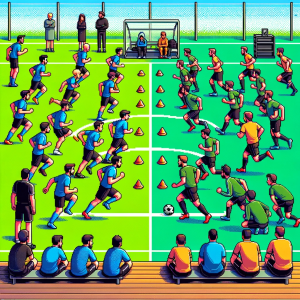
The Psychological Edge: Understanding the Mental Health of High-Performance Soccer Players
The connection between physical activity and health is well-established, with a myriad of benefits linked to regular exercise ranging from better heart health to improved mental well-being. In the realm of sports, particularly at the professional level, the spotlight often shines on physical fitness. However, the mental health of high-performance athletes, such as professional soccer players, is equally crucial, yet not as frequently discussed.

A Closer Look at Mental Health in Soccer
A recent study conducted with Villarreal Soccer Club’s players across first and second divisions sheds new light on this topic. The research aimed to understand the state of mental health among these high-level athletes and examine how factors like sex and division level impact their psychological well-being.
Methodology Simplified
Researchers initially surveyed 108 players, with a final sample of 54 participants completing the study. The methodology was comprehensive, utilizing a suite of psychological scales to measure various mental health dimensions, including anxiety, depression, and impulsivity.
Key Findings and Implications for Soccer Coaching
The findings revealed that, generally, Villarreal players exhibited better mental health compared to the general population. Only a small percentage had engaged in mental health treatments or experienced severe psychopathological symptoms. Interestingly, the study noted significant differences in mental health status between the first and second division players, with second division players showing higher levels of anxiety and depression.
This suggests that the pressure and mental demands may differ significantly between divisions, influencing players’ mental health differently. These insights are crucial for coaches and trainers, highlighting the need for tailored mental health strategies and support systems, especially for lower division players who might be more vulnerable.
Implications for Player Development
The study emphasizes the importance of mental health management as part of player development. Soccer clubs and their coaching staff should consider integrating mental health resources and training into their programs. This can range from regular mental health screenings to providing access to sports psychologists, ensuring that players’ mental and emotional needs are addressed alongside their physical training.
The Role of Gender
The research also touched on gender differences, noting that male and female players might experience and respond to mental stress differently. This underscores the necessity for gender-specific approaches in managing athlete mental health, ensuring that interventions are as effective and supportive as possible.
Beyond the Field: The Broader Implications
These findings not only affect how clubs support their players but also offer insights into how high-performance environments impact mental health. This knowledge is crucial not only for professional sports but for anyone involved in high-stress, high-stakes careers.
Conclusion: A Call for Continued Research
While the study provides significant insights, it also opens the door for further research to explore deeper into the nuanced relationship between professional sports and mental health. As we advance, the goal should be to foster environments that not only push for physical excellence but also promote psychological resilience and well-being.
Engage with Us
Do you think mental health resources in sports are sufficient? Share your thoughts and experiences in the comments below.
Be Part of Soccer’s Scientific Revolution: “Discover the unseen facets of soccer with ‘This Week in Soccer’.
Our newsletter brings you closer to the game’s strategic and scientific dimensions, with content tailored for coaches, educators, and fans alike. Utilizing advanced AI tools, we make complex soccer science accessible and engaging. Don’t just watch soccer, understand it. Subscribe to our newsletter now!
About the Author
Jon Scaccia is a youth soccer coach and translational scientist. He has worked with the Exeter United Soccer Club for over five years, focusing on U5 development. In his day job, he works in data evaluation and implementation science.



